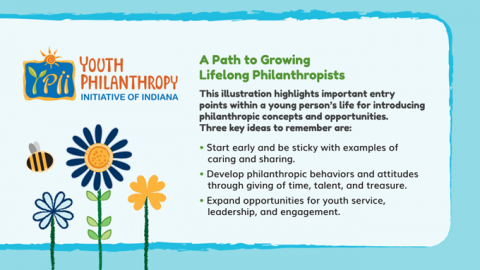What is Giving Compass?
We connect donors to learning resources and ways to support community-led solutions. Learn more about us.
Search our Guide to Good
Start searching for your way to change the world.
Over the past five years I've had the pleasure of talking to many adults that mentor youth through their programs. Audiences come from a variety of youth-serving organizations including school and afterschool programs, foundations supporting youth leadership, and even children's choirs and museums! Most of these adults have something in common; they learned philanthropic behaviors (giving and serving) by seeing the actions of an adult in their own lives. Many times that person is a parent or grandparent, a teacher that helped them develop a talent, or a youth pastor that provided constructive service opportunities.
This illustration (A Path to Growing Lifelong Philanthropists) highlights some of the entry points within when philanthropic concepts and opportunities can be introduced within a young person's life. They are based on child development concepts, the psychological and emotional changes that occur as a young person progresses from dependency to increasing independence.
- Preschool-age children (3-5) are explorers; they learn caring behaviors and attitudes from the examples of others.
- School-age youth (6-10) are ready to explore character development and decision-making.
- In middle childhood (11-13) young people start to think about their place in the world and may dig deeper to express more concern for others.
- Teens (14-18) express more complex thinking and a deeper capacity for sharing and caring.

Let's take a moment to think about who introduced philanthropic behaviors in your life. Who inspired you to GIVE your time and help others? When did you begin to SERVE those around you? Why are you still ENGAGED in helping youth succeed? Who lit the SPARK in your life and what did they teach you? Mentors open the world up to young people, exposing them ideas and nurturing the unique talents they possess. It's also important for us to help youth explore their values and concerns. One of my favorite activities is writing a "Personal Mission Statement", a summary of the aims and values of an individual. If you are working with younger youth, ask them to think of two items they'd "put in their boat" or rescue if their home was about to be destroyed by flood waters.
To continue this journey of Nurturing Lifelong Philanthropists, here are some ways to empower lifelong serving habits in others and to fuel impactful programming and experiences for young people.
Start Early and Stay Sticky with examples of caring and sharing.
- Introduce and nurture caring behaviors in your programs. Celebrate the positive emotions that come with helping others. Ask your young people to describe ways they can "care" and "share" in the classroom.
- Introduce appropriate vocabulary; philanthropy may be a hard word but it's fun to say it this way, "Phil's Aunt Throws Peas!"
- Seek ways to attach philanthropic labels to desired behaviors: recycle, mentor, vote, share, care, volunteer, serve, give, donate, and lead.
Develop philanthropic behaviors and attitudes through giving of time, talent, and treasure.
- Communicate the benefits of volunteering and serving in your own life.
- Make philanthropic activities routine in your programs; work with the community to develop relationships. Invite local nonprofits to speak with your youth and pair that with a hands-on service project.
- Cultivate "good experiences" by incorporating youth's skills and interests, contributions should be empowering!
Expand opportunities for youth service, leadership, and engagement. Conduct a community needs assessment with the youth in your programs.
- List the top five needs/concerns in their community (or school, program, etc.)
- Work in small groups to narrow down to top three.
- Agree on the number one community need and create an action plan/service project!
For more ideas and activities check out the Youth as Philanthropist resource for hands-on activities that help youth explore the time, talent, and treasure they have to share with others.
Most importantly, remember the spark your mentors lit inside of you and pass that along a piece of that to the youth in your lives.
Categories:
- Early Childhood Education